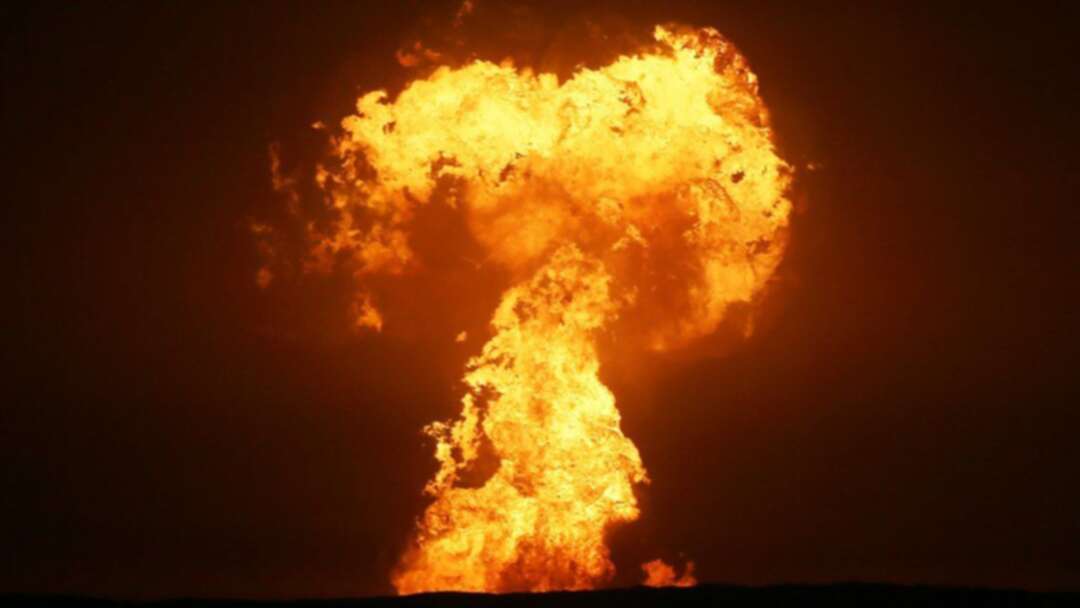-
Azerbaijan Mud Volcano Causes Caspian Sea Explosion

The BBC reported that a strong explosion has been seen off the Caspian Sea area where Azerbaijan has extensive offshore oil and gas fields,sending plumes of black smoke and flames into the sky.
According to the BBC, the government says the blast, which erupted in an area full of oil and gas fields on Sunday, was caused by a mud volcano.
None of the oil farms were damaged and no-one was hurt, it added.
Mud volcanoes are formed underground by water, minerals and flammable gases, which can ignite when they erupt.
Videos shared online showed a fireball and smoke rising above the sea on Sunday.
The BBC reported, citing state oil company Socar spokesman Ibrahim Ahmadoc as saying, the blast took place about 10km (6 miles) from the Umid gas field, which is 75km (45 miles) off the coast of Azerbaijan's capital Baku.
The fire continued to smoulder into Monday, but was threatening neither oil and gas infrastructure nor people's lives, Azerbaijan's emergency ministry said.
It said the fire had been caused by a mud volcano, which spews both mud and flammable gases.
Mud volcanoes are similar to normal volcanoes but without lava. They are caused by water being heated deep within the Earth that mixes with rocks and minerals - when they erupt, this mixture is forced to the surface and can catch fire.
While it is unclear how a mud volcano can catch fire naturally, one theory is that it might happen when a mixture of flammable gases is ignited by sparks from rocks colliding together.
About 400 of the world's estimated 1,000 mud volcanoes are in Azerbaijan.
Nicknamed the "Land of Fire", Azerbaijan is famed for its its rich oil and natural gas reserves. Explorer Marco Polo wrote about the fires in the 13th Century.
"The mud volcanoes in Azerbaijan are some of the biggest and most violent in the world. There are, on average, several large mud volcano eruptions each year, and many of them can have big fires," Dr Mark Tingay, a geophysicist at the University of Adelaide, wrote on Twitter.
The explosion follows a fire on the ocean surface in the Gulf of Mexico, which was extinguished on Friday after burning for more than five hours.
The blaze was blamed on a gas leak from an underwater pipeline.
Source: BBC
Image source: Getty Images-BBC
You May Also Like
Popular Posts
Caricature
BENEFIT Sponsors BuildHer...
- April 23, 2025
BENEFIT, the Kingdom’s innovator and leading company in Fintech and electronic financial transactions service, has sponsored the BuildHer CityHack 2025 Hackathon, a two-day event spearheaded by the College of Engineering and Technology at the Royal University for Women (RUW).
Aimed at secondary school students, the event brought together a distinguished group of academic professionals and technology experts to mentor and inspire young participants.
More than 100 high school students from across the Kingdom of Bahrain took part in the hackathon, which featured an intensive programme of training workshops and hands-on sessions. These activities were tailored to enhance participants’ critical thinking, collaborative problem-solving, and team-building capabilities, while also encouraging the development of practical and sustainable solutions to contemporary challenges using modern technological tools.
BENEFIT’s Chief Executive Mr. Abdulwahed AlJanahi, commented: “Our support for this educational hackathon reflects our long-term strategic vision to nurture the talents of emerging national youth and empower the next generation of accomplished female leaders in technology. By fostering creativity and innovation, we aim to contribute meaningfully to Bahrain’s comprehensive development goals and align with the aspirations outlined in the Kingdom’s Vision 2030—an ambition in which BENEFIT plays a central role.”
Professor Riyadh Yousif Hamzah, President of the Royal University for Women, commented: “This initiative reflects our commitment to advancing women in STEM fields. We're cultivating a generation of creative, solution-driven female leaders who will drive national development. Our partnership with BENEFIT exemplifies the powerful synergy between academia and private sector in supporting educational innovation.”
Hanan Abdulla Hasan, Senior Manager, PR & Communication at BENEFIT, said: “We are honoured to collaborate with RUW in supporting this remarkable technology-focused event. It highlights our commitment to social responsibility, and our ongoing efforts to enhance the digital and innovation capabilities of young Bahraini women and foster their ability to harness technological tools in the service of a smarter, more sustainable future.”
For his part, Dr. Humam ElAgha, Acting Dean of the College of Engineering and Technology at the University, said: “BuildHer CityHack 2025 embodies our hands-on approach to education. By tackling real-world problems through creative thinking and sustainable solutions, we're preparing women to thrive in the knowledge economy – a cornerstone of the University's vision.”
opinion
Report
ads
Newsletter
Subscribe to our mailing list to get the new updates!






















